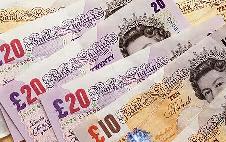Deficit's Record
Britain's deficit hits record £163 billion - but undershoots forecast
 Public borrowing hit its highest level since records began during the 12 months to March but the figures reveal Labour has undershot its target for the year, potentially fuelling the row over the Government's plan to raise national insurance.
Public borrowing hit its highest level since records began during the 12 months to March but the figures reveal Labour has undershot its target for the year, potentially fuelling the row over the Government's plan to raise national insurance.
Public borrowing hit £23.5 billion last month — more than any other March since the end of the Second World War and an increase of £20.1 billion on the same month last year.
Total borrowing, including the costs of bailing out the banks, rose to a high of £152.8 billion.
However, the Government still borrowed less than it forecast in the year, with its preferred measure of borrowing reaching £163 billion, under the £167 billion forecast announced in last month’s Budget. That figure was revised down from an initial estimate of £178 billion.
Total tax receipts rose 3.8 per cent. VAT receipts increased after the rate reverted back to 17.5 per cent in January while corporation tax rose by 51.4 per cent.
Analysts said the lower borrowing figure could provide ammunition for the Conservative Party’s argument against raising National Insurance by 1 per cent. The Tories and more than 80 business leaders claim the increase is a "tax on jobs".
"This may heighten the debate between the parties over Labour’s planned £6 billion hike in national insurance in 2011 - the Conservatives may argue that the undershoot supports their argument that the hike can be avoided," Jonathan Loynes, chief European economist at Capital Economics said.
Total public debt surged to a record £890 million, or 62 per cent of GDP. The Chancellor has forecast that this will rise to nearly 75 per cent of GDP in 2014.
Hetal Mehta, senior economic advisor to the Ernst & Young ITEM Club, said: "While it is still a colossal amount of borrowing, today's figures show a slight undershoot from the Budget projections.
"While that in itself is good news, it is the coming years that still pose more of problem. In our view the current HMT forecasts for the medium term are still far too optimistic, both in terms of the speed of recovery and the extent to which tax revenues will recover."
Alistair Darling has forecast that the economy will grow by 3.25 per cent next year, but many economists and leading organisations such as the International Monetary Fund and OECD forecast a much more modest recovery next year. The IMF expects the British economy to grow by 2.5 per cent next year.
Figures due out tomorrow will reveal if the country is recovering after emerging from recession in the fourth quarter of 2009. City forecasters are expecting GDP to grow by 0.4 per cent between January and March, the same rate of growth recorded between October and December.
Mr Loynes added: "March’s public finances figures have provided the Government with a modest pre-election boost in revealing an unexpected undershoot of the Budget forecasts for borrowing in 2009/10... but the big picture is that this is still the biggest budget deficit since the Second World War and on a rough par with that of Greece."
(Published by Times Online- April 22, 2010)